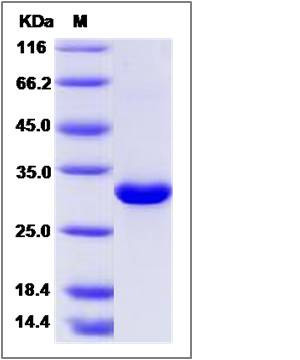Human MBL2 / MBL / COLEC1 Protein
COLEC1,HSMBPC,MBL,MBL2D,MBP,MBP-C,MBP1,MBPD
- 100ug (NPP4073) Please inquiry
| Catalog Number | P10405-HNAS |
|---|---|
| Organism Species | Human |
| Host | CHO Stable Cells |
| Synonyms | COLEC1,HSMBPC,MBL,MBL2D,MBP,MBP-C,MBP1,MBPD |
| Molecular Weight | The recombinant human MBL consists of 228 amino acids and predicts a molecular mass of 24 KDa. It migrates as an approximately 31 KDa band in SDS-PAGE under reducing conditions. |
| predicted N | Glu 21 |
| SDS-PAGE |  |
| Purity | > 95 % as determined by SDS-PAGE |
| Protein Construction | A DNA sequence encoding the human MBL (NP_000233.1) (Met1-Ile 248) was expressed. |
| Bio-activity | |
| Research Area | Signaling |Signal Transduction |Cytoskeleton / ECM |Cell Adhesion |Lectin |C-tyep lectin | |
| Formulation | Lyophilized from sterile PBS, pH 7.4. 1. Normally 5 % - 8 % trehalose and mannitol are added as protectants before lyophilization. Specific concentrations are included in the hardcopy of COA. |
| Background | MBL (mannose-binding lectin) is primarily a liver-derived collagen-like serum protein, which binds sugar structures on micro-organisms and on dying host cells and is one of the four known mediators that initiate activation of the complement system via the lectin pathway. MBL and the ficolins (Ficolin-1, Ficolin-2 and Ficolin-3) are soluble collagen-like proteins that are involved in innate immune defence. They bind sugar structures or acetylated compounds present on microorganisms and on dying host cells and they initiate activation of the lectin complement pathway in varying degrees. MBL2 encodes the mannose-binding lectin, which is a key player in the innate immune system and has recently been found to play a role in development of type 1 diabetes and gestational diabetes mellitus. Common variant alleles situated both in promoter and structural regions of the MBL2 gene influence the stability and the serum concentration of the protein. Several polymorphisms in the promoter and structural regions of MBL2 adversely affect the plasma concentration and oligomeric state of MBL. The possession of mutant alleles has been linked to disease outcome for a variety of bacterial and viral infections. Mutant MBL2 haplotypes have been linked to disease progression and response to therapy in HCV infection. |
| Reference |
